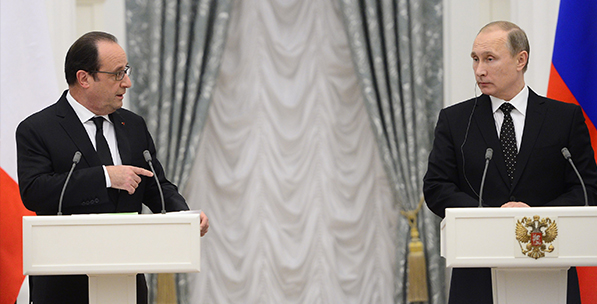Since Russia skillfully utilized Western indifference to prolong the predicament in Syria and became an active combatant force on the ground to support the efforts of Iran and Syrian President Bashar Assad's regime, a prospective military confrontation with Turkey was on the cards. Following his antics in Ukraine and Crimea, which did not arouse meaningful reactions from the U.S. and EU, Russian President Vladimir Putin comfortably entered the theater of war in Syria on the pretext of fighting radical terrorism and DAESH. Especially for pacifist European governments, the Russian presence in Syria following that of the U.S. was something of an unexpected reward, which might have rescued them from dealing with the "terror swamp" there, particularly in the aftermath of the Paris attacks. In the meantime, Putin was busy advancing his own turf war by taking control of the maximum amount of land through comprehensive bombing raids and redrawing the geopolitical and ethno-social map of Syria up until Jan. 1, after which the transition process assumed in the Vienna talks would be operational. Russia countered the de facto alliance between the U.S. air force and Kurdish People's Protection Units (YPG) ground forces by forming a compact with its air force, the land units of the Assad regime and the paramilitary groups supported by Iran. But Putin's alleged struggle against DAESH was conducted in a way that avoided the bedrocks of DAESH's presence, such as Raqqa, but instead focused on areas controlled by groups affiliated with the moderate Syrian opposition and the Turkmens around the Bayırbucak province.
Turkey, on the other hand, was extremely disturbed by the rough geopolitical game that Putin was playing next to its borders with substantial potential consequences on its national security and aggravation of refugee flows. President Recep Tayyip Erdoğan and Prime Minister Ahmet Davutoğlu repeatedly warned Russia that the indiscriminate bombing of localities in Syria under the guise of fighting DAESH was creating new waves of migration and the efforts to weaken the moderate opposition were intolerable. Geopolitically, the sudden and substantial entrance of Russia into the Syrian war theater rendered Turkey's plans to create a safe zone in northern Syria and balance YPG forces with groups from the moderate opposition very difficult. But the straw that broke the camel's back for Ankara came with the heavy bombing of the Bayırbucak Turkmens, who represent a relatively small community with strong historical, social and cultural links to Turkey as they were part of the Ottoman Empire up until its dissolution. Despite the lack of a DAESH presence in the Bayırbucak area, systematic Russian air attacks caused hundreds of deaths and forced thousands to migrate toward Turkey; a move that was perceived as ethnic engineering in a region close to the stronghold of the Assad regime in Latakia.
Then came the critical episode whereby a Russian Su-24 fighter jet was downed by Turkish F-16s after it was warned to not violate Turkish airspace 10 times within a short period of time, but continued its course, disregarding all warnings. As far as international law and established practices are concerned, Turkey is standing on firm ground as it previously declared the rules of engagement and applied them indiscriminately to all air vehicles coming from the warzone in Syria. But not surprisingly, Putin portrayed this action as an act of betrayal and famously stated that they "were stabbed in the back;" launching an all-out disinformation attack that portrayed Turkey as an unreliable, unpredictable country associated with DAESH and supporting international terrorism. The fact that all this happened against the backdrop of Russian aggression in Syria presents a bizarre picture of distortion in international politics in which an imperial power bombing civilians abroad plays innocent, and a virtuous power like Turkey is being forced into the position of systemic outcast just for protecting its national sovereignty.
Overt threats coming from Moscow concerning limitations on Turkey's agricultural and industrial exports, cancellation of tourist reservations, potential interruptions in common projects and even calls to reconsider the flow of natural gas to Turkey represent familiar instances of bullying that the Kremlin uses in critical international conjunctures. You would have to be naïve to assume that Erdoğan and Turkey will step back from its principled position on the protection of national sovereignty on border security and keep silent on Russian aggression in Syria as a result of this bullying. Those who stand with justice win in the long term.
[Daily Sabah, November 28, 2015]






